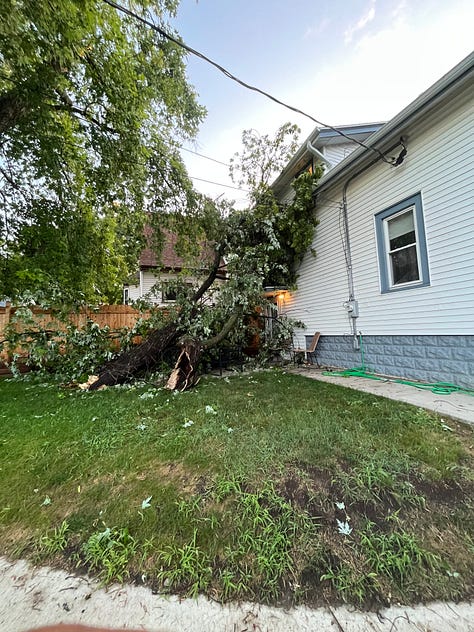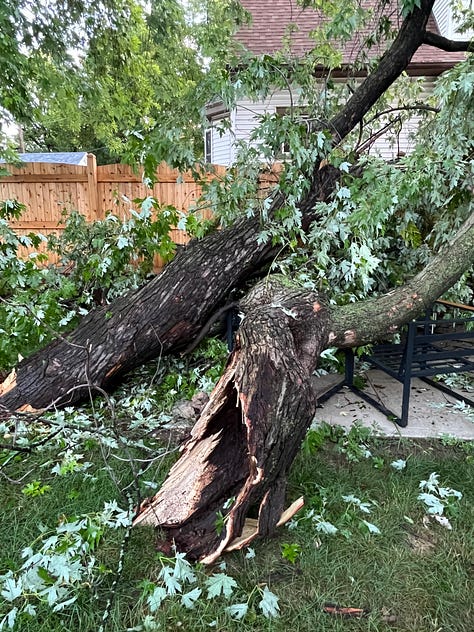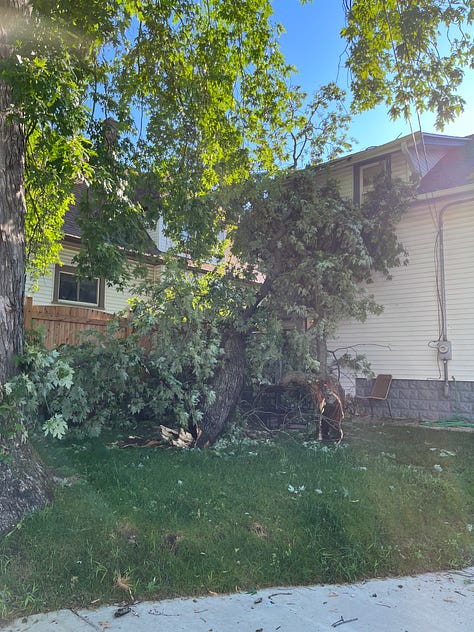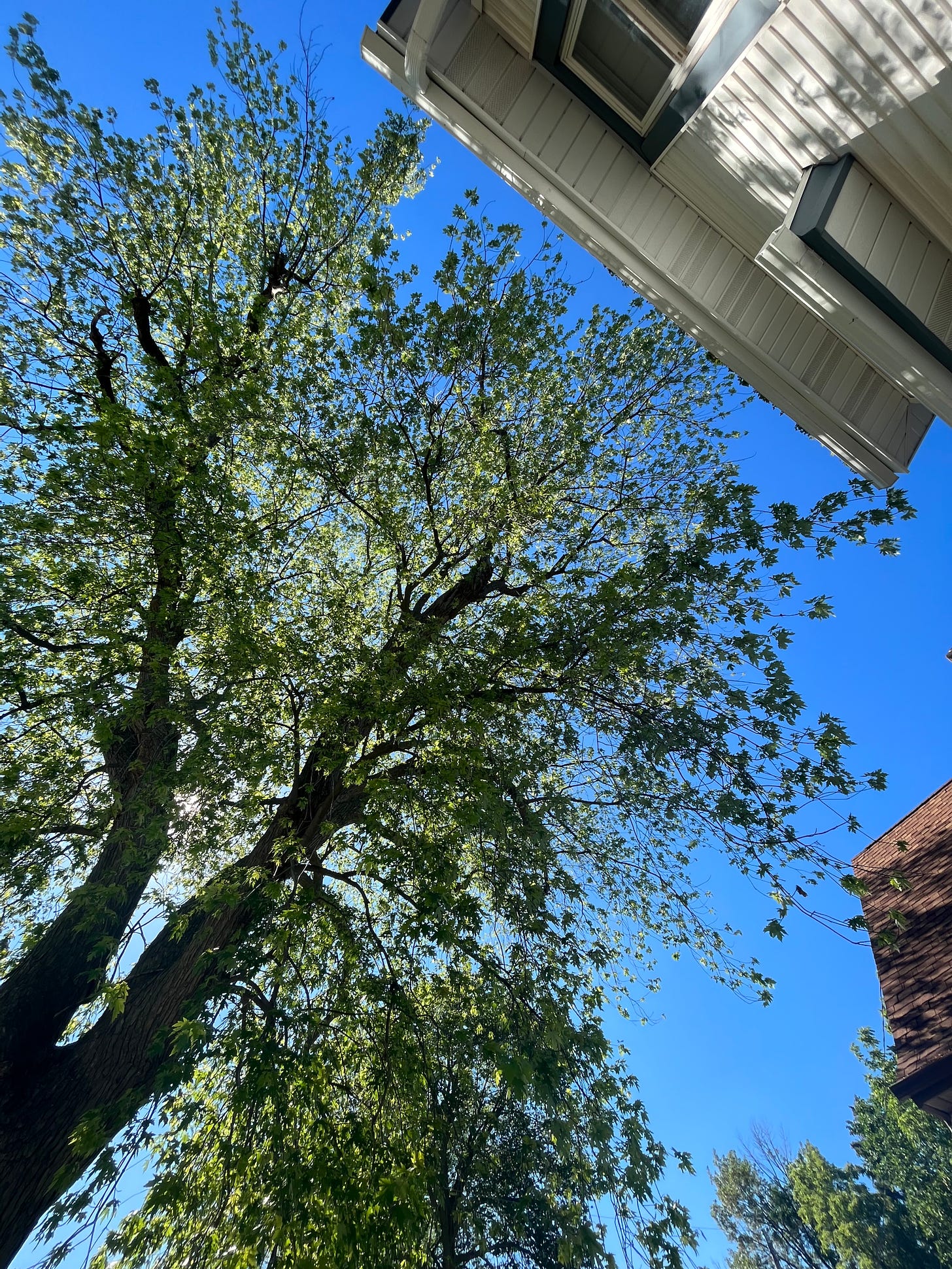When we packed our car and moved from the East Coast back to the Midwest, we were greeted by the wide green canopy of a Silver Maple.
She stands tall, a dozen feet higher than any other tree around. She is ambitious, stretching high and far to grasp the sunlight in her leaves. She is a mother tree—so firmly planted and strong-willed that our entire neighborhood has bent itself to her wishes. Under her watch are centuries of life and death, of joy and sadness, of bending forces met by a refusal to break. Through her roots, she whispers wisdom to the saplings around. In her branches, she cares for the creatures who scavenge below.
For over a year, our Silver Maple took us under her care, too: providing an umbrella in the Spring, shade in the summer afternoon, and an abundance of leaves in the Fall. Each time I stepped outside, our mother tree was a rooted reminder of God’s power and presence at work in the dirt, nourishing the smallest blades of grass and largest trees. “Consider the lilies, how they grow: they neither toil nor spin,” Jesus says. “If God so clothes the grass of the field, which is alive today and tomorrow is thrown into the oven, how much more will he clothe you—you of little faith.”
I have spent days underneath our tree, listening to the humming of the maple wood and the rustling of the leaves. I think about the roots of the tree branching out into the dirt below, grabbing on tightly because it knows God is there and refuses to let go. This mother tree, wise in her years, knows that life is not promised. It is something she must cling to. It is something she must daily receive from the earth below.
The meditations and prayers underneath this gentle protector illuminated for me a sense of dwelling and sacrality with Jesus formed, as Willie Jennings describes “through the Spirit as a way of sensing and understanding the embracing of God of the creation and the joy of God of being embraced by the creature.”



Last summer, during a midnight storm, our home violently shook as glass and siding shattered. Rushing to the hallway, the towering branches that once protected me from rain and sun now pierced through our home in an unexpected intrusion. Our back door—the passageway to an evergreen reminder of grace—was now barricaded shut by a thicket of leaves and branches. Our mother tree and her ferocious will had met its match.
The next morning, we walked out our front door at dawn and slowly made our way to the backyard. The familiar passage never held such great dread—not only for the state of our house but the thought of losing our tree. What could it mean for this tree, a reminder of God’s grace and presence with us, to fall on our home? Why would God care for the grass and the lilies, but let this great tree fall?
To our surprise, the mother tree stood tall even as she bore the scars of the storm. Next to her, leaning against our home, were two branches so large that they extended to our second-floor window. The air smelled of wood and bark—the bright flesh of broken branches cutting through the dark, damp exterior.
In the months following, our daily routine felt different: the broken window was boarded with cardboard and tape (the new window needs manufacturing); the phone rang with calls from the insurance company (our adjuster is delayed); our patio shined hot and bright (the sunlight no longer must weave between a forest of leaves and branches); our yard furniture jabbed into my back awkwardly (the result of bending back once-crushed metal).
This week, our beloved Silver Maple will be cut down.
After nearly a year of worrying every windy day and stormy night, every heavy snowfall and sound of thunder, it is time to say goodbye.
There’s something offensive about this—to move into a place and decide to remove the life that has existed there longer than anyone living today. To own—to possess private property—and enact one’s will over such a powerful force is an odd reality.
Even more, what I cannot shake in my soul are all the times that Jesus, when asked to explain or describe the divine, bends down and puts his hand in the dirt. “I am the vine, you are the branches,” he declares (John 15:1–17). “The Kingdom is like tiny mustard seed” he teaches, “that, when planted, grows into a tree” (Luke 13:18–19). The Gospel is like a seed, Jesus tells his disciples, that falls on good soil and brought fold grain a hundredfold (Matthew 13:1-9).
There is something about the ground, in both joy and toil, that declare to us who God is.
There’s also something about death and dying that does the same. While our Silver Maple will be gone, it will make room for new life—for a garden to grow and grass to be planted. Its material will be used as firewood and mulch, serving others long after its own life.
My hope is that our lives might do the same. That we might embrace our own ephemerality and finitude and, in return, live a life that thinks not only of this moment, but all that will come after we are gone. That we may live like the silver maple in the backyard.
Reading:
Christian Wiman, He Held Radical Light (Farrar, Straus and Giroux, 2018)
David W. Congdon, Who is a True Christian? (Cambridge, 2024).
Ashish Varma “The Rocks Shall Cry Out! Why not the Dust, Too?” (World Outspoken)
Watching:
Monkey Man
Invincible (Prime Video)




